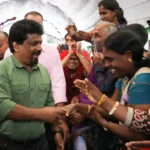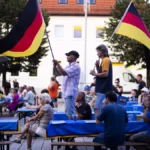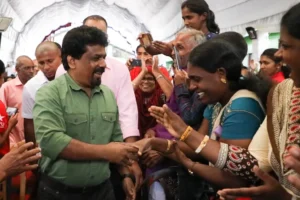The German Left party will take the fight to the far-right ahead of next June’s European election, the party leadership announced at the presentation of its draft manifesto on Monday (11 September), but it faces an uphill battle amid internal divisions.
The presentation followed the introduction of migration activist Carola Rackete as one of the top candidates for the party list. Rackete gained notoriety through a stand-off with former Italian premier Matteo Salvini over her attempt to dock a migration-rescue vessel at an Italian port.
The Left’s leadership sees its campaign as a “battle cry” against the looming rightward shift in the election, the leaders told reporters.
“The Italian government and the fascist forces there, such as Salvini and (Giorgia) Meloni, now claim the election will be about ‘our Europe’ against ‘Carola Rackete’s Europe’, so they have clearly understood that we want to challenge them,” Janine Wissler, co-leader of the Left, said, adding that the threat from an emboldened far-right was serious.
The draft manifesto will pit an agenda of “social justice, peace and climate justice against the rise of the right”, according to Wissler. Notably, the Left will seek to pursue this through the use of EU institutions and legislation this time, in contrast to the more confrontational and eurosceptical EU election campaigns of the past.
“It’s not like the EU has always been uncontroversial within the Left,” Martin Schirdewan, co-leader of the Left and chair of the Left in the European Parliament, acknowledged.
Demands for more redistribution
At the heart of the manifesto lies redistribution away from “corporations and the rich”.
The Left proposes European-level enforcement of stricter labour standards, European taxes on windfall profits, the creation of European funds to reverse privatisations, and also a coordinated expansion and price regulation for railways across the continent in the form of a “United Railways of Europe” project.
The final text is due to be adopted at a party conference starting on 17 November.
However, it is unclear if the party’s proposals will gain any momentum in Brussels. If left-of-centre parties will lose seats in the European Parliament as predicted, any legislation would require the support of at least one group on the right. The Left in Germany is also fighting weak poll ratings. It has been struggling to get past the 5% threshold needed to elect members to the Bundestag and is expected to retain its current 5 seats at best.
Schirdewan pointed to support from extra-parliamentary “allies such as trade unions and movements” and “pressure from civil society (…) which has often helped the party group to find majorities.”
Threat of a split
While condemning what it described as “Russia’s attack on Ukraine”, the Left also controversially called for an immediate ceasefire and negotiations in Ukraine, as well as a ban on arms exports to war zones. This agenda could gain an unconventional boost in the new parliament, as several parties on the right have advocated a similar policy.
Sanctions against Russia are moreover a pet topic of Sahra Wagenknecht, a prominent Left lawmaker who has been threatening to form her own party to contest the June 2024 polls.
Wagenknecht doubled down on her plans over the weekend, raising the spectre of additional competition for the Left. However, the Left’s leaders refused to “speculate about a party that doesn’t exist yet and of which it is doubtful if it will ever exist.”
Source : Euractiv
















